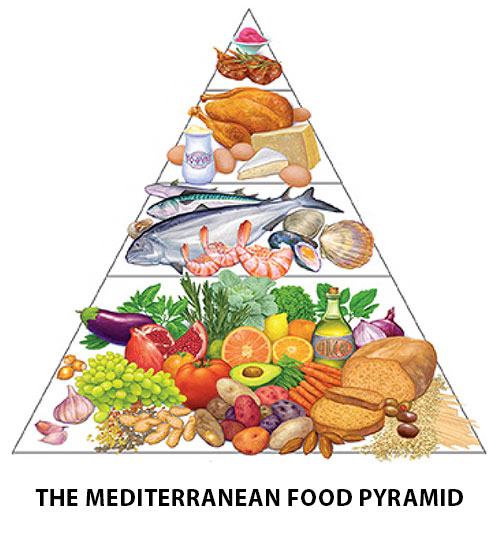
Mediterranean Diet
History generally proves that the culture and tradition of a people significantly rub off on their eating habits. This is no less true for people from countries around the Mediterranean Sea such as Greece, Spain, and Italy. The Mediterranean diet is the region’s people’s peculiar eating pattern which started becoming predominant in the 1940s. It encompasses locally sourced fresh foods that are in season.

The diet comprises portions of olive oil, unrefined cereals, fish and dairy products in moderation, legumes, fruits, and vegetables, etc. Moderate consumption of wine along with the meals is also encouraged.
According to Suzy Weems, a registered dietitian, and professor of nutrition science at Baylor University:
“The Mediterranean diet is more of a general eating pattern and lifestyle.”
Pros and Cons of the Mediterranean Diet / Eating Plan
Pros
Key reasons for the adoption of the Mediterranean eating plan are based on the several health benefits associated with it. Some of these include:
Promotes Heart Health
The Mediterranean diet has been found to be beneficial to the heart. In a study carried out by Dr. Ancel Keys on people living in poorer areas of southern Italy, he discovered that these people had a lower risk of heart disease than people living in wealthier parts of New York. This was traceable to their diet.
Research has revealed that there is a link between a reduction in the consumption of red meats and added sugars and a low incidence of stroke and coronary heart disease. This is attributed to the presence of monounsaturated fats in the Mediterranean diets which focus on fruits and vegetables.
Promotes Good Mental and Physical Health
A study by Italian researchers has also demonstrated that the fiber and antioxidants present in the Mediterranean diet help in the maintenance of mental and physical health. The diet also entails daily physical activities that are enjoyable. These activities help in staying fit and healthy.
Helps Protect Against Type 2 Diabetes
Another important benefit of the Mediterranean eating plan is the fact that it can help both in providing protection against type 2 diabetes and in improving glycemic control.
Cons
Despite its numerous benefits and its growing popularity with doctors, dietitians and foodies alike, the very nature of the Mediterranean eating plan is fraught with certain problems.
No Exact Measurements
The diet does not stipulate exact serving amounts per day. It rather uses words such as “low to moderate intake” which is not a well-defined amount. The decision on what constitutes moderate is left to the individual’s interpretation. The parameters of calorie intake and physical activities are not also specified.
Wine Consumption And Negative Effects
The consumption of wine is part of the Mediterranean diet. But for people taking certain medication, this may not be ideal. Wine consumption is a disservice to people with elevated triglycerides and pancreatitis.
Who Is This Eating Plan For?
The health benefits of the plan make it valuable for everyone looking to maintain good health. Apart from the benefits already stated above, studies have also found that men and women who follow the diet plan have a lower risk of aggressive prostate cancer and breast cancer respectively.
According to Time Inc:
“The news about the Mediterranean diet keeps getting better. Two studies were recently published about the less-known benefits of the popular eating plan: In one, men who followed the diet had a lower risk of aggressive prostate cancer, and in the other, longtime followers had a reduced risk of becoming frail in old age.”
The diet has also been recently distinguished as the Best Diet for 2018 by U.S. News and World Report.
What sporting activities can you improve your performances in by implementing a Mediterranean diet plan?
Different athletes of different types of sports can benefit from this diet. The concern for many is usually the diet’s supposedly low-carb reputation. But this can easily be remedied by serving sweet potatoes, whole wheat pasta, and bread as side dishes.
What are some of the foods allowed and disallowed in a Mediterranean diet?
Some other foods can be taken side by side with the diet. These include foods like beans, yogurt, and eggs. These combinations are especially geared to people with an active lifestyle.
Unhealthy oils and fats such as butter and margarine are discouraged. So are red meats, excessive wine, etc.
What are some of the medical benefits of the Mediterranean diet?
The Mediterranean diet has been medically proven to provide numerous benefits. Some of these include a reduction in the risk of type 2 diabetes, prevention of kidney disease, cancers, etc.
The Mediterranean diet as a healthy eating pattern has been medically proven to be useful for the prevention of cardiovascular diseases, increasing lifespan, and contributing to healthy aging
What are some of the downsides of the Mediterranean diet?
The diet may not fully satisfy the needs of a certain class of people as athletes, for example.
A lack of exact specification may also affect the results gotten by different people who follow the plan. Some of these results can even affect one’s overall well-being negatively.
Are there any famous athletes and celebrities who’re on the Mediterranean Plan or who’ve tried it before?
Generally, top athletes take their diet seriously. Most seek to maintain a healthy diet that helps them perform at their best.
Top American Marathoner, Mike Wardian once described his diet as comprising of fruits, vegetables, nut butter and dairy amongst other foods. This is similar to the components of the Mediterranean diet.
In 2011, actress Penelope Cruz told the Daily Mirror in an interview: “My diet is the Mediterranean diet, which is good food.”
Are there any medical studies on the Mediterranean Plan?
Studies have consistently revealed that the Mediterranean diet is effective in reducing the risk of cardiovascular diseases as well as overall mortality.
Interests in the diet’s effects on aging and cognitive function have led to medical studies on the subject. One such study focuses on the impact of the Mediterranean diet on a specific part of DNA called telomeres, which naturally shorten with age. The length size of telomeres can be used to predict life expectancy as well as the risk of a person developing age-related diseases.
Antioxidants, which are a major component of the diet, help combat cell stress and thereby preserve telomere length. A Nurses’ Health Study involving 4676 healthy middle-aged women revealed that those who closely followed the Mediterranean diet maintained longer telomere length.



